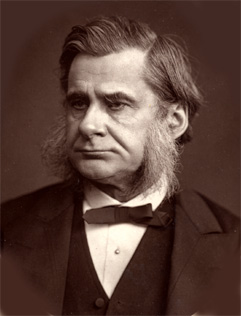X Club
A dining club for intellectual discussion in Victorian England
The X Club was a dining club of nine men who supported the theories of Charles Darwin and scientific naturalism in the late 19th century. The club was founded in November 1864 and was active until 1893. The members of the X Club were influential in the scientific community and played a significant role in the promotion of Darwinism and the professionalization of science in Victorian England.
Founding and Purpose[edit | edit source]
The X Club was founded by Thomas Henry Huxley, John Tyndall, and Joseph Dalton Hooker. The primary purpose of the club was to promote the ideas of Charles Darwin and to support the advancement of science free from religious dogma. The club met monthly for dinner and discussion, providing a forum for the exchange of ideas among some of the most prominent scientists of the time.
Members[edit | edit source]
The original members of the X Club were:
- Thomas Henry Huxley - Biologist and anthropologist, known as "Darwin's Bulldog" for his advocacy of Darwinism.
- John Tyndall - Physicist known for his work on the Tyndall effect and the study of diamagnetism.
- Joseph Dalton Hooker - Botanist and explorer, a close friend of Charles Darwin.
- Edward Frankland - Chemist known for his work on valence and organometallic chemistry.
- Thomas Archer Hirst - Mathematician and educator.
- George Busk - Surgeon, zoologist, and paleontologist.
- John Lubbock - Banker, politician, and biologist, known for his work in archaeology and entomology.
- William Spottiswoode - Mathematician and physicist, later President of the Royal Society.
- Herbert Spencer - Philosopher known for his contributions to evolutionary theory and social Darwinism.
Influence and Legacy[edit | edit source]
The X Club wielded considerable influence in the scientific community and beyond. Members of the club held key positions in various scientific institutions, including the Royal Society, and were instrumental in the establishment of scientific journals such as Nature. The club's advocacy for scientific naturalism helped to shift the scientific paradigm away from religious explanations and towards a more empirical and rational approach.
The X Club also played a role in the professionalization of science, promoting the idea that scientific research should be a full-time occupation and advocating for the establishment of research institutions and funding for scientific endeavors.
Meetings and Activities[edit | edit source]
The X Club met monthly at the St. George's Hotel in London. Meetings were informal and focused on discussion and debate. The club did not have a formal agenda, and topics ranged from scientific theories to social and political issues. The convivial atmosphere of the meetings fostered a sense of camaraderie and mutual support among the members.
Dissolution[edit | edit source]
The X Club continued to meet until 1893, when the declining health and deaths of several members led to its dissolution. Despite its relatively short existence, the X Club left a lasting impact on the scientific community and the promotion of Darwinism and scientific naturalism.
See also[edit | edit source]
References[edit | edit source]
External links[edit | edit source]
Search WikiMD
Ad.Tired of being Overweight? Try W8MD's physician weight loss program.
Semaglutide (Ozempic / Wegovy and Tirzepatide (Mounjaro / Zepbound) available.
Advertise on WikiMD
|
WikiMD's Wellness Encyclopedia |
| Let Food Be Thy Medicine Medicine Thy Food - Hippocrates |
Translate this page: - East Asian
中文,
日本,
한국어,
South Asian
हिन्दी,
தமிழ்,
తెలుగు,
Urdu,
ಕನ್ನಡ,
Southeast Asian
Indonesian,
Vietnamese,
Thai,
မြန်မာဘာသာ,
বাংলা
European
español,
Deutsch,
français,
Greek,
português do Brasil,
polski,
română,
русский,
Nederlands,
norsk,
svenska,
suomi,
Italian
Middle Eastern & African
عربى,
Turkish,
Persian,
Hebrew,
Afrikaans,
isiZulu,
Kiswahili,
Other
Bulgarian,
Hungarian,
Czech,
Swedish,
മലയാളം,
मराठी,
ਪੰਜਾਬੀ,
ગુજરાતી,
Portuguese,
Ukrainian
Medical Disclaimer: WikiMD is not a substitute for professional medical advice. The information on WikiMD is provided as an information resource only, may be incorrect, outdated or misleading, and is not to be used or relied on for any diagnostic or treatment purposes. Please consult your health care provider before making any healthcare decisions or for guidance about a specific medical condition. WikiMD expressly disclaims responsibility, and shall have no liability, for any damages, loss, injury, or liability whatsoever suffered as a result of your reliance on the information contained in this site. By visiting this site you agree to the foregoing terms and conditions, which may from time to time be changed or supplemented by WikiMD. If you do not agree to the foregoing terms and conditions, you should not enter or use this site. See full disclaimer.
Credits:Most images are courtesy of Wikimedia commons, and templates Wikipedia, licensed under CC BY SA or similar.
Contributors: Prab R. Tumpati, MD

